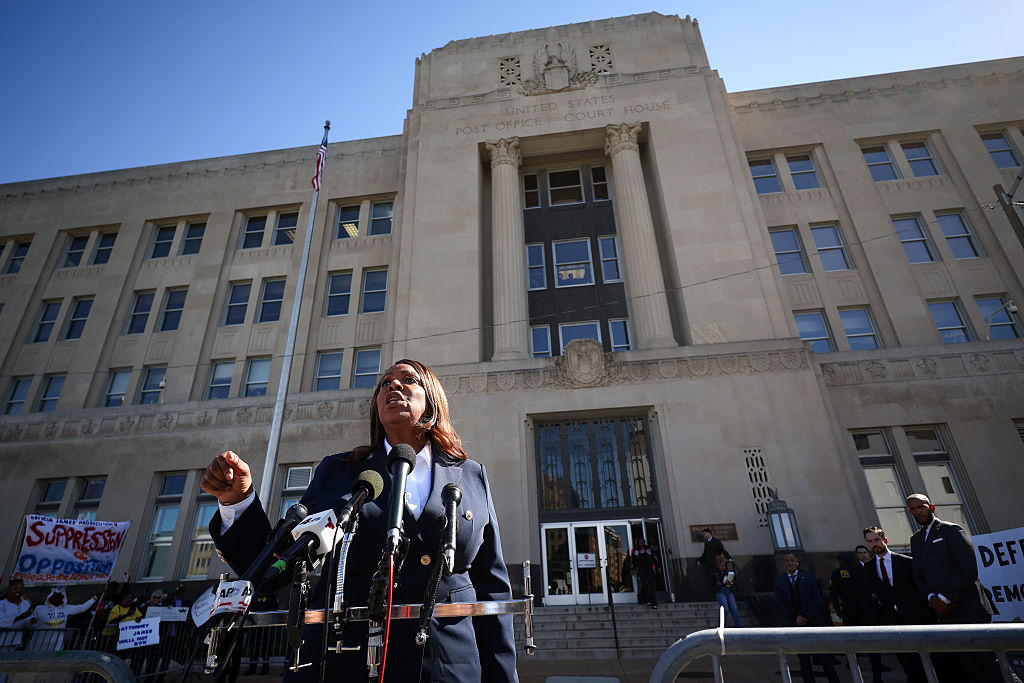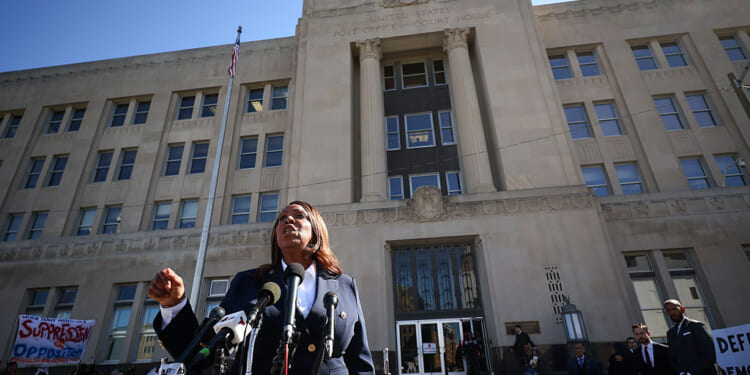
Legal and forensic experts weigh in on high-stakes procedural battle.
A visibly defiant, and sometimes angry, Letitia James basked in the adulation of a cheering crowd outside of the federal courthouse in Norfolk, Virginia, on Friday morning. She relished the high-profile status of her alleged victimhood. By their signs and their chants, the crowd appeared to share James’ condition of Trump Derangement Syndrome. Inside the courtroom, she pleaded ‘not guilty’ to one charge of bank fraud, and another for making false statements to a financial institution. Her attorneys filed their Motion to Dismiss the case against her before US District Judge Jamar Walker, a Biden-appointee. James is challenging the authority of interim US Attorney Lindsey Halligan to prosecute the case, claiming her appointment was violative of the Appointments Clause of the US Constitution. Her attorneys wrote:
“The Executive Branch violated the Appointments Clause by purporting to appoint Ms. Halligan as interim U.S. Attorney without the advice and consent of the Senate and without any alternative statutory authority to do so. The Appointments Clause establishes that the President shall not appoint ‘Officers of the United States,’ i.e., principal officers, without ‘the advice and consent of the Senate…’”
The argument stems from Halligan’s predecessor, interim US Attorney Erik Siebert, who was appointed by Us Attorney General Pam Bondi on January 21, 2025. President Trump submitted Siebert’s nomination to the Senate, but his interim appointment expired 120 days later, on May 21. The district court judges of the Eastern District of Viriginia exercised their statutory appointment authority to retain Siebert, who reportedly did not find sufficient evidence to charge James. Siebert resigned in September, reportedly hours after Trump called for him to be ousted. On September 22, Bondi appointed Halligan as interim U.S. Attorney. James’ attorneys argue Bondi’s authority to appoint Halligan expired on May 21. This argument copies the argument former FBI Director James Comey’s attorneys made in the criminal case against him. The question of the validity of Halligan’s appointment in both cases will be on the same docket for another judge to decide. The Fourth Circuit designated Clinton-appointed Judge Cameron McGowan Currie from the US District of South Carolina to decide Comey’s motion.
Andrew McCarthy, attorney and senior fellow at National Review Institute, wrote on National Review, his contention – since Halligan’s appointment – that there are grounds for its disqualification.
“Since that term expired under Siebert, Halligan could not lawfully be appointed absent the court’s consent (which the Trump administration never sought, and which would surely be rebuffed if it were sought due to Halligan’s lack of prosecutorial experience). The Trump Justice Department’s counter-position — namely, that the statute should be construed to allow the president to make serial interim appointments for the same vacancy — would defeat the statutory text, and thus the appointments clause’s mandate that the appointment of inferior officers must be in accordance with statutory law.”
McCarthy concedes the Department of Justice has until November 3 to file its response to Comey’s motion.
Jonathan Turley, attorney, author, and professor of public interest law at George Washington University, noted the Halligan challenge in an interview with FOX News on October 10. Turley said the case would not be an easy one for the Justice Department. “There’s an argument that the Trump administration could make against that,” Turley said. “But it means there’s going to be a threshold challenge that could delay a trial. And I think that’s what they’re counting on.”
Vindictive Prosecution
In court on Friday, Walker reportedly specifically pointed to a motion to dismiss for “selective or vindictive prosecution,” that is pending in the Comey case. The judge reportedly asked James’ attorney Abbe Lowell if he also intends to ask for a dismissal based on a claim that the Department of Justice unfairly prosecuted James, a claim James has maintained.
“This justice system, which has been used as a tool of revenge,” James said outside of the federal court on Friday,” and a weapon against those individuals who simply did their job and who stood up for the rule of law.”
But, that argument, Turley says, will be more difficult than the question of Halligan’s appointment. “Those types of cases, I’ve made those types of arguments in court, as a criminal defense attorney,” Turley said, “They’re very hard to make. Judges do not like to look at motivations, if there’s an otherwise valid crime in the indictment.”
Walker reportedly allowed James’ legal team until November 7 to request a dismissal based on the selective or vindictive prosecution claim. The government will have until November 21 to respond to it. A hearing on the motion is scheduled for December 5.
Just the Beginning
Forensic accountant Sam Antar says he helped gather the documents that form the basis of the DOJ’s prosecution of James. He alleges James has committed “serial mortgage fraud,” with two other properties in Norfolk and Brooklyn, and 13 mortgages over a period of 43 years.
“The media would have you believe that this is an isolated incident because they don’t want to talk about the other properties that she’s going to be indicted for, which I believe she’s going to be indicted. This is just the beginning,” Antar said. “There’s going to be a superseding indictment. But when you look at one property by itself, it makes it easier for them to say it’s a one off. It’s a mistake. Okay. But when you look at the pattern of behavior spanning to 1983, you say every single mortgage that she signed contained false information.”
Walker reportedly scheduled any possible additional challenges to the charges to be filed by November 17. A hearing on those requests is scheduled for December 17.
James’ trial is scheduled to begin on January 26, 2026. What happens before trial is expected to be a complicated technical procedural battle.
Liberty Nation does not endorse candidates, campaigns, or legislation, and this presentation is no endorsement.

















